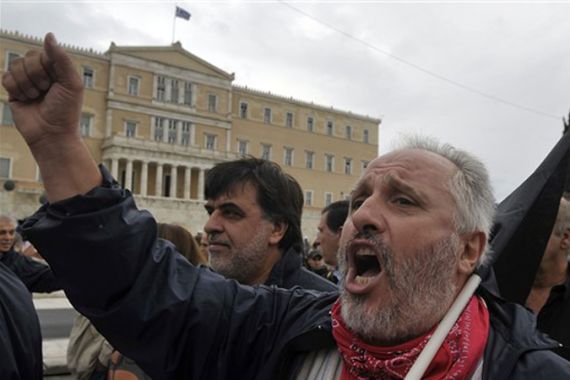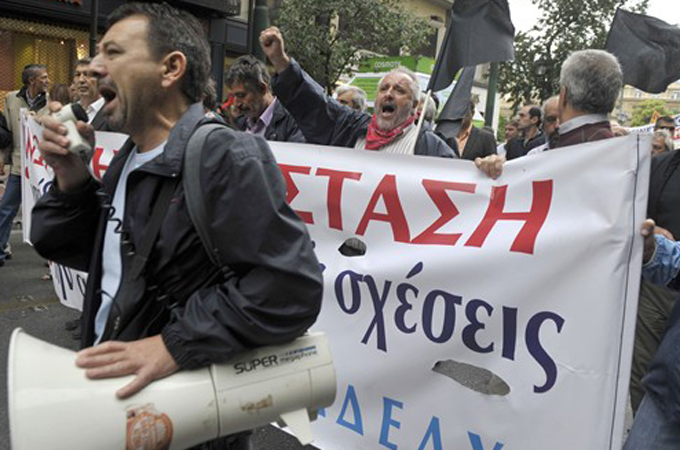Anti-austerity protests in Europe
Public workers in Greece stage strike as workers march in Bulgaria and Macedonia over retirement age.

 |
| Protesters in Greece held banners reading ‘Tax the rich’ and ‘No sacrifices for the IMF’ [AFP] |
Fresh protests have been staged across several European countries over plans by respective governments to bring about greater austerity.
Public servants in Greece went on a 24-hour strike while thousands took to the streets in Bulgaria and Macedonia on Thursday to protest against policies to raise the retirement age.
Keep reading
list of 4 items‘We need you’: Solomon Islands’ support for US agency’s return revealed
Why are nations racing to buy weapons?
Parallel economy: How Russia is defying the West’s boycott
About 10,000 workers protested in Sofia, the Bulgarian capital, against a plan by the nation’s conservative government to raise the retirement age to 65. The country’s Confederation of Independent Trade Unions is demanding that the age be kept unchanged – 63 for men and 60 for women.
Unions said they will keep protesting until a formal agreement is reached.
Meanwhile, in Macedonia, more than 2,000 uniformed police officers marched through the capital of Skopje to protest at changes to their retirement age.
The police officers gathered outside the country’s constitutional court to dispute its decision to repeal provisions that had allowed them to retire after 40 years of service, no matter what their age.
In Romania, President Trajan Basescu refused to sign a pension bill passed by the national parliament that would make men and women retire at the age of 65.
Women workers in Romania currently retire at 58 and men at 62.
Basescu sent the legislation, which has been validated by Romania’s constitutional court, back to parliament. Romania’s two main opposition parties have threatened to impeach Basescu if he signs the bill into law.
Greek strike
Greek public sector workers walked out of their jobs protesting against EU and International Monetary Fund (IMF) prescribed austerity measures.
Air traffic controllers joined Thursday’s strike, widely affecting flights in and out of Greece. Schools and some public services shut down, while public hospitals worked with emergency staff.
The austerity measures have hit civil servants particularly hard, with wages cut by an average of 15 per cent, in addition to tax hikes and a pension freeze agreed to help restore the country’s finances in return for a 110 billion euro ($154bn) EU/IMF bailout.
“Thank God I do not have a family. I would be in great trouble. They have slashed my salary by 20 per cent,” Christos Kourniotis, 44, a public school teacher marching in Athens, said. “We cannot go on like this.”
But turnout at protest rallies during the day were comparitively low. Protesters held banners reading “Tax the rich” and “No sacrifices for the IMF”.
The government this week announced further belt-tightening in next year’s draft budget. The economy is seen contracting by 2.6 per cent in 2011, after a 4 per cent slump this year.
“2011 will be a tough year, but our aim is to work together – state, citizens, social partners – to turn 2011 into the last year of recession. We can do it,” George Papandreou, the prime minister, told parliament on Thursday.
Private sector union GSEE has said it will not strike any time soon, easing pressure on the ruling Socialists as they struggle to pull Greece out of its worst recession since 1979.
But civil servants say they are not going to back down.
“We will keep protesting, demanding that the new budget does not include any further salary cuts,” Ilias Iliopoulos, general secretary of public sector union ADEDY, said.